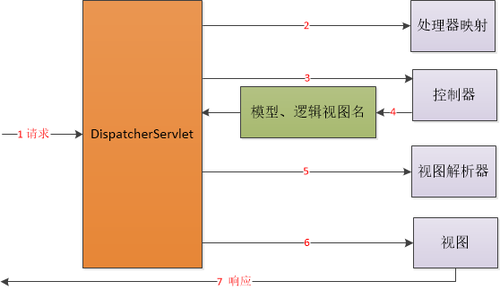SpringMVC基于模型-视图-控制器(MVC)模式实现,可以构建松耦合的web应用程序。
1、SpringMVC的请求过程
1)请求离开浏览器,并携带用户所请求的内容
2)DispatcherServlet角色为调度员(前端控制器)。查询一个或多个处理器映射确定处理请求的控制器
3)将请求发给选中的控制器业务处理
4)控制器处理完成后,将业务数据封装为模型,并指定一个逻辑视图名,一起返回给DispatcherServlet
5)DispatcherServlet将逻辑视图名匹配一个特定视图实现
6)使用模型数据渲染出指定的视图
7)返给前端展示
2、springMVC工程配置
web.xml
<!DOCTYPE web-app PUBLIC "-//Sun Microsystems, Inc.//DTD Web Application 2.3//EN" "http://java.sun.com/dtd/web-app_2_3.dtd" > <web-app> <!--<context-param>--> <!--<param-name>contextConfigLocation</param-name>--> <!--<param-value>classpath:applicationContext.xml</param-value>--> <!--</context-param>--> <!--<listener>--> <!--<listener-class>org.springframework.web.context.ContextLoaderListener</listener-class>--> <!--</listener>--> <servlet> <servlet-name>appServlet</servlet-name> <servlet-class>org.springframework.web.servlet.DispatcherServlet</servlet-class> <init-param> <param-name>contextConfigLocation</param-name> <param-value>classpath:springMvc.xml</param-value> </init-param> </servlet> <servlet-mapping> <servlet-name>appServlet</servlet-name> <url-pattern>/</url-pattern> </servlet-mapping> </web-app>
springMvc.xml
<?xml version="1.0" encoding="UTF-8"?> <beans xmlns="http://www.springframework.org/schema/beans" xmlns:xsi="http://www.w3.org/2001/XMLSchema-instance" xmlns:context="http://www.springframework.org/schema/context" xmlns:aop="http://www.springframework.org/schema/aop" xmlns:mvc="http://www.springframework.org/schema/mvc" xsi:schemaLocation="http://www.springframework.org/schema/beans http://www.springframework.org/schema/beans/spring-beans.xsd http://www.springframework.org/schema/context http://www.springframework.org/schema/context/spring-context.xsd http://www.springframework.org/schema/aop http://www.springframework.org/schema/aop/spring-aop.xsd http://www.springframework.org/schema/mvc http://www.springframework.org/schema/mvc/spring-mvc.xsd"> <!-- 扫描控制器 --> <context:component-scan base-package="com.cn.controller"></context:component-scan> <!-- 处理器映射 --> <mvc:annotation-driven></mvc:annotation-driven> <!-- 视图解析器 --> <bean class="org.springframework.web.servlet.view.InternalResourceViewResolver"> <property name="prefix" value="/WEB-INF/jsp/"></property> <property name="suffix" value=".jsp"></property> </bean> </beans>
3、控制器
接受参数的方式
查询参数
表单参数
路径变量
控制器
package com.cn.controller;import com.cn.pojo.User;import org.springframework.stereotype.Controller;import org.springframework.validation.Errors;import org.springframework.web.bind.annotation.PathVariable;import org.springframework.web.bind.annotation.RequestMapping;import org.springframework.web.bind.annotation.RequestParam;import javax.validation.Valid;
@Controllerpublic class HelloController {
@RequestMapping("/home") public String home(){
System.out.println("执行home"); return "home"; //返回一个字符串,即逻辑视图名 }
@RequestMapping("/home2") public String home2(){
System.out.println("执行home2"); return "redirect:home3"; //含有redirect的字符串,表示重定向到另一个处理器; //如果含有forward的字符串,表示转向到另一个处理器 }
@RequestMapping("/home3") public String home3(){
System.out.println("输出home"); return "home3";
}
@RequestMapping("/show3") //表单参数,,@Valid注解与添加了校验注解的User配合使用 public String showPerson3(@Valid User user, Errors errors){//Errors参数必须紧跟@Valid的参数
if (errors.hasErrors()){//校验是否有校验未通过的参数
System.out.println("表单元素校验不通过"); return "fail";
}
System.out.println("用户信息:"+user); return "success";
}
@RequestMapping("/{name}/{age}") //路径参数 http://localhost:8080/tt/123 输出:名称:tt 年龄:123;; public String showPerson2(@PathVariable(value = "name") String name,
@PathVariable(value = "age") String age){
System.out.println("名称:"+name+" 年龄:"+age); return "success";
}
@RequestMapping("/show") //查询参数 http://localhost:8080/show?name=pp&age=99 输出:名称:pp 年龄:99;; public String showPerson(@RequestParam(value = "name", defaultValue = "laowang") String name,
@RequestParam(value = "age", defaultValue = "100") String age){
System.out.println("名称:"+name+" 年龄:"+age); return "success";
}
}POJO
package com.cn.pojo;import com.sun.istack.internal.NotNull;import javax.validation.constraints.Size;public class User {
//表单参数校验
@NotNull
@Size(min = 6,max = 10) private String firstName;
@NotNull
@Size(min = 6,max = 10) private String lastName;
@NotNull
@Size(min = 6,max = 10) private String name;
@NotNull
@Size(min = 6,max = 10) private String passwd; public String getFirstName() { return firstName;
} public void setFirstName(String firstName) { this.firstName = firstName;
} public String getLastName() { return lastName;
} public void setLastName(String lastName) { this.lastName = lastName;
} public String getName() { return name;
} public void setName(String name) { this.name = name;
} public String getPasswd() { return passwd;
} public void setPasswd(String passwd) { this.passwd = passwd;
}
@Override public String toString() { return "User{" +
"firstName='" + firstName + '\'' +
", lastName='" + lastName + '\'' +
", name='" + name + '\'' +
", passwd='" + passwd + '\'' +
'}';
}
}4、视图解析器
在控制器中返回的字符串(不包含redirect、forward)表示逻辑视图名,而不会调用具体的视图实现。spring的视图解析器能够决定使用哪种视图实现去渲染模型。SpringMvc定义了一个ViewResolver 接口,返回为View对象
public interface ViewResolver {
View resolveViewName(String var1, Locale var2) throws Exception;
}View接口定义,其中render方法接受模型、request、response参数,并将模型数据渲染到response中
public interface View {
String RESPONSE_STATUS_ATTRIBUTE = View.class.getName() + ".responseStatus";
String PATH_VARIABLES = View.class.getName() + ".pathVariables";
String SELECTED_CONTENT_TYPE = View.class.getName() + ".selectedContentType";
String getContentType(); void render(Map<String, ?> var1, HttpServletRequest var2, HttpServletResponse var3) throws Exception;
}视图解析器的实现
Spring提供了ViewResolver 多个内置的实现,比如InternalResourceViewResolver、TilesViewResolver...其中InternalResourceViewResolver(最简单、最常用的视图解析器)将视图解析为Web应用的内部资源(一般为jsp)
创建JSP视图
Spring支持两种JSP视图的方式---使用InternalResourceViewResolver
方式1:在页面中使用JSP标准标签库(JSTL),InternalResourceViewResolver能够将视图名解析为JstlView形式的JSP文件
方式2:使用Spring提供的JSP标签库(两个:一个用于表单到模型的绑定;另一个提供了通用工具类特性)
a、配置适用于JSP的视图解析器
<bean class="org.springframework.web.servlet.view.InternalResourceViewResolver"> <property name="prefix" value="/WEB-INF/jsp/"></property> <property name="suffix" value=".jsp"></property> </bean>
控制器中返回的字符串与该配置中的前后缀拼接成完成的文件路径,控制器中返回的字符串如果包含了斜线,则可以区分出了不同的目录。该配置会将逻辑视图名解析为InternalResourceView实例。
如过JSP中使用JSTL标签来处理内容,则希望视图解析器将视图解析为JstlView实例。仅仅添加一行配置文件即可:
<bean class="org.springframework.web.servlet.view.InternalResourceViewResolver"> <property name="viewClass" value="org.springframework.web.servlet.view.JstlView"></property> <property name="prefix" value="/WEB-INF/jsp/"></property> <property name="suffix" value=".jsp"></property> </bean>
b、Spring的JSP的标签库
原文出处:https://www.cnblogs.com/shixiemayi/p/9568454.html
共同学习,写下你的评论
评论加载中...
作者其他优质文章






